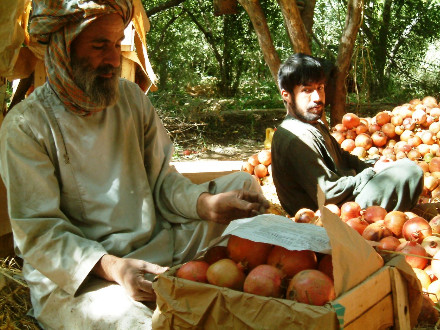KABUL, 19 October 2010 (IRIN) - It is the season for harvesting pomegranates - a major fruit crop in Kandahar Province, southern Afghanistan - but some farmers say fighting there has badly affected their farms and livelihoods.

Some pomegranate farmers say they can't work in their farms due to insecurity. (Photo: Sarwar Amani/IRIN)
“My pomegranate garden has been totally destroyed,” said Obaidullah, a farmer in Kandahar’s Arghandab District where NATO-led forces have launched a major anti-Taliban operation.
“We are unable to work in our farms because of the war,” said another farmer, Ahmad Jan, from the same district.
Government officials acknowledge that the war has damaged agriculture but blame the insurgents.
“The Taliban have planted explosives on some farms, meaning farmers cannot irrigate their land, so the pomegranate trees have dried up,” Toryalai Weesa, the governor of Kandahar, told IRIN.
Hundreds of foreign and Afghan forces are engaged in military operations in the Arghandab, Panjwaye and Zheray districts of Kandahar Province aiming to drive out Taliban insurgents, according to NATO officials.
IRIN contacted NATO’s press office in the south of Afghanistan for a comment on the impact of military operations on agriculture but was told the regional command was “busy” and “focused on matters in hand”.
Pomegranates and grapes are the main sources of livelihood for thousands of families in the province.
The government, backed by donors such as the United States Agency for International Development, promotes fruit exports. A new transit agreement, signed between Afghanistan and Pakistan in July, allows Afghan traders to export local agricultural produce by road to Indian markets.
Insecurity, displacement
Meanwhile, provincial officials said they were unable to send assessment teams to Arghandab, Panjwaye and other districts to determine the extent of the damage to farms due to insecurity.
“We don’t know how many farmers have been affected,” said governor Weesa.
“I can’t go to the districts due to insecurity,” said Ahmad Shah Roshan, caretaker of the provincial agriculture department.
Several farmers from Arghandab and Panjwaye districts said the activities of different armed groups were forcing them to abandon their homes and that as a result they were seeking refuge Kandahar city.
“The Taliban force us to support them - for which the government and foreigners tease us,” said one elderly man, Attaullah, adding that local militias were also extorting money from people and punishing them if they failed to comply.
“We don’t know what to do,” said another man, Agha Mohammad. “The government tells us to take up arms against the Taliban while the Taliban punish us for even talking to a government official.”
During his visit to Arghandab District on 9 October, President Hamid Karzai called on local people to join government forces in fighting the insurgents.
Ahmad Wali Karzai, the younger half-brother of President Karzai and chairman of the provincial council, said he had received at least one complaint from a farmer in Arghandab about the establishment of a government military post in his pomegranate garden. “Apart from this, I have received no complaints,” Wali Karzai told IRIN.
Stronghold
Kandahar city was the Taliban capital in 1995-2001. With an estimated population of 1.1 million, the predominantly Pashtun province of Kandahar has suffered increased violence and insecurity since 2004, and is often described as a Taliban stronghold.
Security concerns prompted UN agencies to withdraw most of their international staff from Kandahar city in April; local staff were advised to stay at home.
The International Committee of the Red Cross (ICRC) says the number of conflict casualties taken to the hospital it supports in Kandahar city has hit record levels: In August and September, about 1,000 people with weapons-related injuries were taken to Mirwais Regional Hospital for treatment - an almost 50 percent increase on the same period last year, the ICRC said in a 12 October statement.
Tens of thousands of people have also been displaced by fighting over the past year; many suffer lack of assistance and protection, aid agencies told IRIN.



